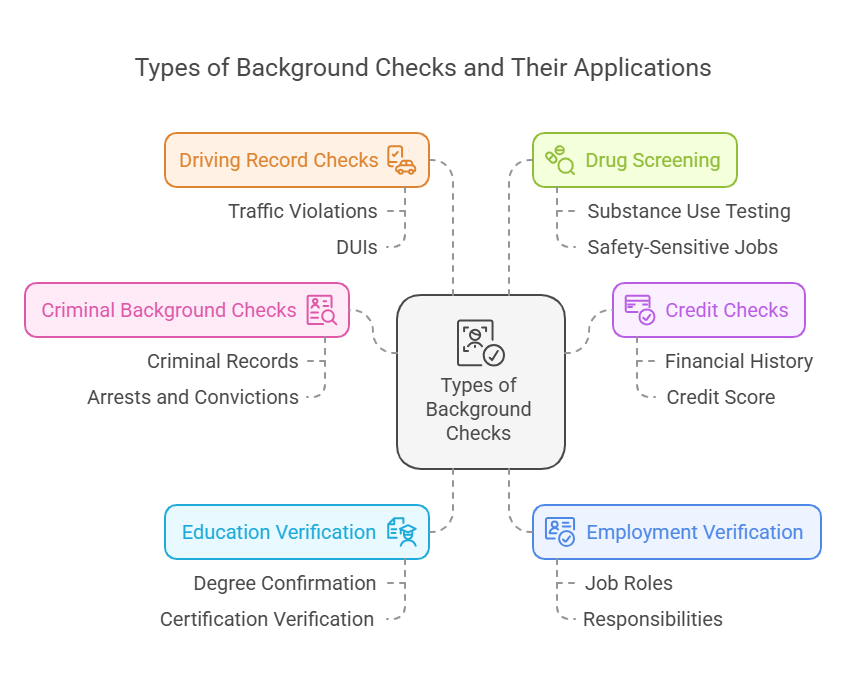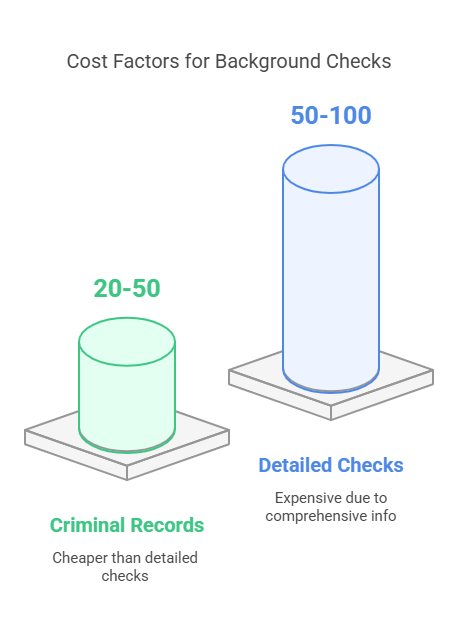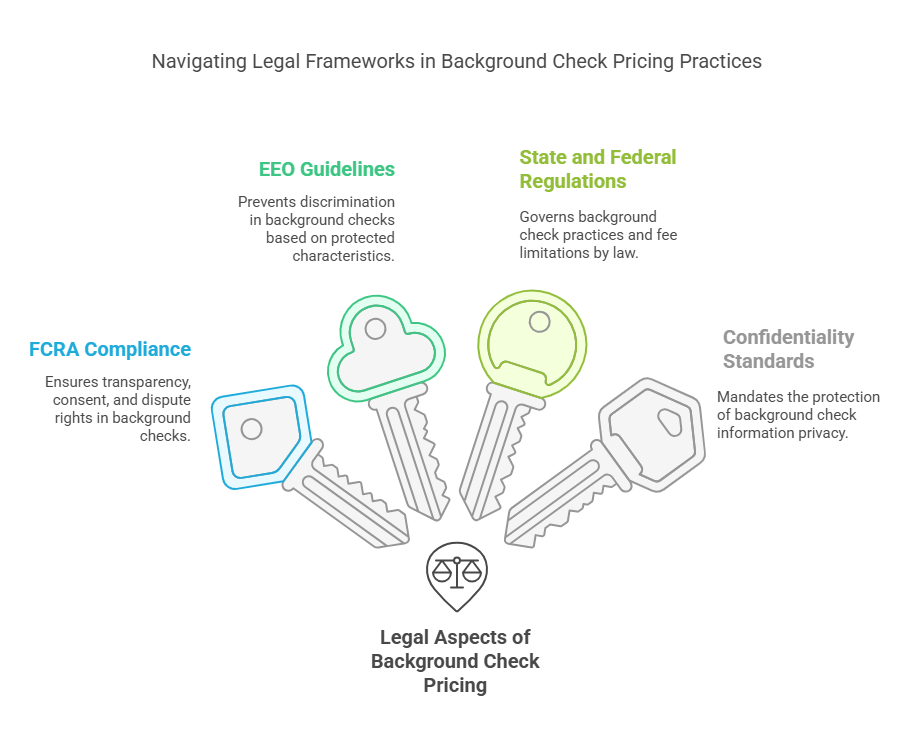Factors Influencing Background Check Prices

What Is a Background Check?
A background check is a process used to verify an individual’s history, credentials, and character. These checks are commonly performed in scenarios like:
- Employment Screening: To ensure candidates meet job requirements.
- Tenant Screening: To evaluate potential renters.
- Personal Investigations: For personal or legal purposes, such as child custody or business partnerships.
The primary goal is to provide reliable information that can help decision-makers assess trustworthiness and minimize risks.
Types of Background Checks

The type of background check requested determines the scope and depth of the investigation. Common types include:
- Criminal Background Checks
- Reveals criminal records, arrests, or convictions.
- Used by employers and landlords.
- Credit Checks
- Evaluates an individual’s financial history.
- Often required for financial roles or rental applications.
- Education Verification
- Confirms degrees, certifications, and attendance dates.
- Used in industries requiring specific qualifications.
- Employment Verification
- Validates past work history, roles, and responsibilities.
- Essential for senior-level hires or critical roles.
- Driving Record Checks
- Assesses traffic violations or DUIs.
- Relevant for roles involving driving.
- Drug Screening
- Tests for substance use.
- Standard in safety-sensitive jobs.
Factors That Affect Background Check Prices

The cost of a background check varies significantly based on several factors:
- Type of Background Check:
- Criminal records are generally cheaper ($20–$50) than detailed credit or employment checks ($50–$100+).
- Depth of Information:
- Comprehensive checks requiring detailed verifications cost more.
- Location-Specific Fees:
- Some states or counties charge fees to access public records.
- Service Provider:
- In-house Background Checks: Require time and resources but may save money.
- Third-Party Agencies: Offer convenience and accuracy but can be more expensive.
Average Price Ranges for Common Background Checks
| Type of Background Check | Typical Cost Range |
|---|---|
| Criminal History Check | $20–$50 |
| Credit Check | $25–$75 |
| Employment Verification | $40–$100+ |
| Education Verification | $30–$70 |
| Drug Testing | $30–$60 |
| Driving Record Check | $20–$30 |
These costs can vary depending on the region, volume of checks, and customization required.
Why Prices Vary for Background Checks
While some checks are inexpensive, others require additional research or third-party verifications, which increases costs. Businesses and individuals should carefully assess their needs before selecting a service.
Key Factors That Determine Background Check Costs
1. Government Fees for Public Records Access
One of the most significant factors influencing background check pricing is the cost of accessing public records.
- State and County Fees: Certain states and counties charge fees to provide access to criminal records, court documents, or other public records. These fees can range from $5 to over $50, depending on the jurisdiction and the type of record being requested.
- Specialized Records: Accessing specific records, such as civil court cases or bankruptcy filings, may also come with additional charges.
- Variability by Location: Some states have standardized fees, while others allow local jurisdictions to set their own pricing, creating regional cost differences.
2. Turnaround Time
The speed at which results are delivered can significantly impact costs.
- Standard Processing: Background checks performed within normal timelines are generally more affordable. Depending on the service, standard processing may take anywhere from 24 hours to several weeks.
- Rush Processing: Employers or individuals needing expedited results can opt for rush services, but these typically come at a premium. Rush processing is often used in industries with urgent hiring needs, such as healthcare or seasonal work.
3. Volume Discounts for High-Volume Users
Companies that conduct a high volume of background checks, such as staffing agencies or large organizations, often benefit from discounted pricing.
- Bulk Pricing: Many providers offer tiered pricing structures, where the cost per check decreases as the number of screenings increases.
- Customized Packages: Large employers can negotiate packages that include specific services, such as ongoing employee monitoring, at reduced rates.
4. Additional Verification Services
The inclusion of additional services beyond basic criminal history checks can increase costs.
- Employment Verification: Confirming past employment can cost $40–$100 or more per check, depending on the depth of the verification.
- Education Verification: Verifying academic credentials typically costs between $30 and $70.
- Drug Testing: Adding drug screening services to a background check package can range from $30 to $60 per test.
- Credit Reports: Used in tenant or financial screenings, credit checks can cost $25–$75.
These services add value by providing comprehensive insights but can significantly impact overall pricing.
5. Type of Background Check Conducted
The type of background check requested plays a crucial role in determining costs:
- Criminal Background Checks: These are often the most common and affordable type of check, costing around $20–$50.
- Driving Record Checks: Used for positions involving driving responsibilities, these checks cost $20–$30.
- Comprehensive Background Checks: These involve multiple screenings, such as criminal, credit, and employment verification, and can cost $100 or more per candidate.
6. Third-Party Agencies vs. DIY Checks
Choosing between a third-party agency and conducting checks in-house also impacts pricing.
- Third-Party Agencies: These providers charge for their expertise, technology, and access to databases, ensuring accurate and compliant results. While more expensive upfront, they save time and reduce the risk of errors.
- DIY Checks: Conducting background checks independently may seem cost-effective but requires significant time and resources to navigate public records, verify information, and comply with legal standards.
How Employers, Landlords, and Individuals Can Choose the Right Service
Choosing the right background check provider involves weighing the cost against the quality and reliability of the service. Below are tailored recommendations for different user groups:
Tips for Employers
- Tailor the Screening Process: Focus on the checks most relevant to the role, such as driving records for transportation jobs or education verification for specialized positions.
- Opt for Bundled Services: Many providers offer discounts for combining multiple screenings into a single package, such as criminal, credit, and drug tests.
- Prioritize Compliance: Ensure the provider adheres to legal standards like the Fair Credit Reporting Act (FCRA) to avoid potential lawsuits or disputes.
Tips for Landlords
- Invest in Tenant Screening: Choose services that include credit checks, eviction histories, and criminal records to make informed decisions about potential tenants.
- Verify Income and Employment: For high-value properties, consider adding income verification to ensure tenants can meet financial obligations.
- Save with Bundled Packages: Many screening agencies offer landlord-specific packages that combine all essential checks at a lower cost.
Tips for Individuals
- Focus on Self-Checks: Individuals seeking jobs or rental opportunities can perform personal background checks to identify and address any potential issues in advance.
- Understand the Fees: Be aware of government and provider fees associated with accessing your own records.
- Use Reputable Services: Choose established providers to ensure the accuracy and completeness of your results.
Reducing Background Check Costs Without Sacrificing Accuracy
While background checks are essential for ensuring safety and compliance, there are ways to manage expenses effectively:
- Choose Bundled Packages: Combining multiple checks often reduces the per-check cost.
- Utilize Technology-Driven Providers: Agencies with automated systems offer faster and more affordable services by minimizing manual labor.
- Plan Ahead: Avoid rush fees by initiating background checks well in advance of hiring or tenant deadlines.
- Negotiate Volume Discounts: If you’re an employer or landlord requiring frequent checks, negotiate rates for bulk services.
- Review Service Offerings: Not all providers offer the same level of service for the same price—compare multiple options to find the best value.
ExactBackgroundChecks: Affordable and Reliable Background Check Solutions
ExactBackgroundChecks is a trusted provider offering comprehensive, cost-effective solutions for all your screening needs. Their services include:
- Customizable Packages: Tailored to meet the unique needs of employers, landlords, and individuals.
- Competitive Pricing: Offers affordability without sacrificing quality or compliance.
- Quick Turnaround Times: Fast results for both standard and rush processing needs.
- Comprehensive Offerings: Includes criminal history checks, credit reports, drug testing, and more.
Whether you’re an employer, a landlord, or an individual seeking to understand your own background, ExactBackgroundChecks ensures accuracy, efficiency, and compliance with all legal standards.
Comparison Table: Background Check Types and Costs
| Type of Background Check | Average Cost | Turnaround Time | Use Case |
|---|---|---|---|
| Criminal Background Check | $20–$50 | 1–3 days | Employment, rental applications |
| Credit Report Check | $25–$75 | 1–3 days | Tenant screening, financial positions |
| Drug Testing | $30–$60 | 1–2 days | Workplace safety, pre-employment screening |
| Education Verification | $30–$70 | 3–5 days | Hiring for skilled or specialized positions |
| Employment Verification | $40–$100+ | 3–7 days | High-level roles requiring verified experience |
| Driving Record Check | $20–$30 | 1–2 days | Jobs involving driving responsibilities |
Legal Aspects of Background Check Pricing

1. Compliance with the Fair Credit Reporting Act (FCRA)
The Fair Credit Reporting Act (FCRA) governs how background checks are conducted and ensures that individuals’ rights are protected.
- Pricing Transparency: Background check providers must disclose their fees clearly, preventing hidden charges.
- Consent Requirement: Employers and landlords must obtain written consent before conducting background checks on individuals.
- Dispute Rights: If the information provided in a background check is inaccurate, individuals have the right to dispute the results and request corrections.
2. Equal Employment Opportunity (EEO) Guidelines
Background checks must not discriminate against candidates based on protected characteristics such as race, gender, age, or disability.
- Employers must ensure that background screening practices, including pricing considerations, are applied uniformly across all candidates.
- Adverse action decisions, such as rejecting a candidate based on a background check, must be supported by job relevance.
3. State and Federal Regulations
State and federal laws influence how background checks are conducted and what fees are permissible.
- Ban-the-Box Laws: Some states and localities prohibit employers from inquiring about criminal history until later stages of the hiring process.
- Fee Limits: Certain jurisdictions may impose caps on fees for specific checks, such as criminal record searches.
- Consumer Protection Laws: Providers must ensure that pricing practices align with consumer protection statutes.
4. Confidentiality Standards
Employers and screening agencies are legally obligated to maintain the confidentiality of background check results.
- Background reports must only be shared with authorized parties.
- Unauthorized disclosure of sensitive information can result in legal penalties.
FAQs About Background Check Pricing
What are the common types of background checks, and what information does each provide?
Common types include:
- Criminal Background Checks: Reveal criminal records, arrests, or convictions.
- Credit Checks: Evaluate financial history.
- Education Verification: Confirms degrees and attendance.
- Employment Verification: Validates past work history.
- Driving Record Checks: Assesses traffic violations or DUIs.
- Drug Screening: Tests for substance use.
What factors affect the cost of a background check?
Factors include:
- Type of background check.
- Depth of information required.
- Location-specific fees for public records.
- Service provider (in-house vs. third-party agency).
- Turnaround time.
- Volume discounts.
- Additional verification services.
What are the average price ranges for common background checks?
Typical cost ranges:
- Criminal History Check: $20–$50
- Credit Check: $25–$75
- Employment Verification: $40–$100+
- Education Verification: $30–$70
- Drug Testing: $30–$60
- Driving Record Check: $20–$30
How can employers, landlords, and individuals choose the right background check service?
- Employers: Tailor screenings, opt for bundled services, prioritize compliance.
- Landlords: Invest in tenant screening, verify income, use bundled packages.
- Individuals: Focus on self-checks, understand fees, use reputable services.
What legal aspects govern background check pricing?
Legal aspects include:
- Fair Credit Reporting Act (FCRA): Requires pricing transparency, consent, and dispute rights.
- Equal Employment Opportunity (EEO) Guidelines: Prohibits discrimination.
- State and Federal Regulations: Ban-the-box laws, fee limits, consumer protection laws.
- Confidentiality Standards: Requires protection of sensitive information.
What are the common types of background checks, and what information does each provide?
Common types include:
- Criminal Background Checks: Reveal criminal records, arrests, or convictions.
- Credit Checks: Evaluate financial history.
- Education Verification: Confirms degrees and attendance.
- Employment Verification: Validates past work history.
- Driving Record Checks: Assesses traffic violations or DUIs.
- Drug Screening: Tests for substance use.
What factors affect the cost of a background check?
Factors include:
- Type of background check.
- Depth of information required.
- Location-specific fees for public records.
- Service provider (in-house vs. third-party agency).
- Turnaround time.
- Volume discounts.
- Additional verification services.
What are the average price ranges for common background checks?
Typical cost ranges:
- Criminal History Check: $20–$50
- Credit Check: $25–$75
- Employment Verification: $40–$100+
- Education Verification: $30–$70
- Drug Testing: $30–$60
- Driving Record Check: $20–$30
How can employers, landlords, and individuals choose the right background check service?
- Employers: Tailor screenings, opt for bundled services, prioritize compliance.
- Landlords: Invest in tenant screening, verify income, use bundled packages.
- Individuals: Focus on self-checks, understand fees, use reputable services.
What legal aspects govern background check pricing?
Legal aspects include:
- Fair Credit Reporting Act (FCRA): Requires pricing transparency, consent, and dispute rights.
- Equal Employment Opportunity (EEO) Guidelines: Prohibits discrimination.
- State and Federal Regulations: Ban-the-box laws, fee limits, consumer protection laws.
- Confidentiality Standards: Requires protection of sensitive information.
Conclusion
Understanding background check pricing is essential for employers, landlords, and individuals seeking accurate and reliable screenings. Key factors such as the type of check, government fees, turnaround times, and additional services can significantly influence costs. Legal compliance with FCRA, EEO guidelines, and state regulations ensures transparency and fairness in pricing practices.
For those looking for comprehensive, affordable, and legally compliant background checks, ExactBackgroundChecks stands out as a trusted provider. Offering customizable packages, fast turnaround times, and exceptional accuracy, ExactBackgroundChecks helps employers and individuals make informed decisions with confidence.
Whether you’re an employer seeking top-tier candidates, a landlord screening potential tenants, or an individual verifying your own records, understanding background check costs and choosing the right service provider is critical to achieving your goals. Explore ExactBackgroundChecks today for accurate, affordable, and reliable background screening solutions.



